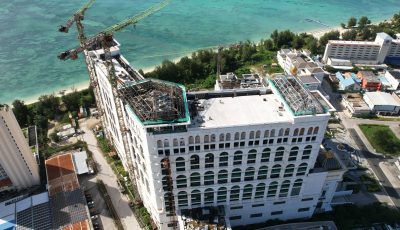Interior’s Zinke recommends local access to monument
Interior Secretary Ryan Zinke wants the Marianas Trench Monument to continue to be federally protected, but acknowledged that it should be accessible as a resource to those who live in the area.
In his report to President Donald J. Trump last Friday, Zinke recommends that the 27 national monuments, including the Marianas Trench Marine Monument, should continue to be federally protected, with a change as to who may access the monuments’ grounds.
Trump tasked Zinke to review a total of 27 national and marine monuments that were established since 1996 that are over 100,000 acres (the Marianas Trench Marine Monument being one) for 120 days since the executive order back in April.
The review was intended to provide recommendations to the administration on which monuments should be scaled down and those that should be eradicated and turned over to their respective states.
The review was based on three steps, according to Zinke’s report.
First, Zinke was required to gather facts through examinations of what the monument protected, why it became federally protected under the Antiquities Act, uses of the monument, public and traditional access concerns, etc.
Second was to hear out local voices that would be directly affected by the eradication of the monument. Meetings were held and comments were welcomed through the department’s website. The department received over 2.5 million comments. Comments were received from proponents and opponents.
The third step required Zinke to review the facts gathered and to provide a report to the administration.
According to Zinke’s report, each monument is unique in its own way, but the Marianas Trench Marine Monument is deemed aligned with the Antiquities Act’s original purpose, which is preservation.
The Marianas Trench, like all the other monuments that were reviewed by Zinke, was strongly supported by the community. It is also deemed beneficial to the economy through increased tourism, but those benefits are not being realized because the Antiquities Act do not make them accessible.
Zinke believes that the monuments, like the Marianas Trench Marine Monument, should not be inaccessible to the people who should reap the monument’s benefits.
“No president should use the authority under the Antiquities Act to restrict public access, prevent hunting and fishing, burden private land, or eliminate traditional land uses, unless such action is needed to protect the object,” said Zinke.
Zinke’s report states that the monument should remain as it is, under federal ownership, but a compromise should be made in regards to accessibility.
“The recommendations I sent to the President on national monuments (including marine monuments) will maintain federal ownership of all federal land and protect the land under federal environmental regulations, and also provide a much needed change for the local communities who border and rely on these lands for hunting and fishing, economic development, traditional uses, and recreation,” he said.



























